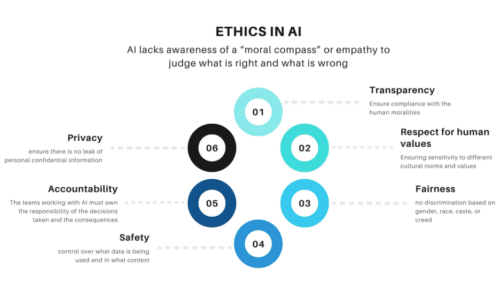Imagine computers writing songs for you, articles for you, completing your assignments, interacting with you like a real person, and doing so many such things. One such emerging technology is Artificial Intelligence (AI). One is unavoidably surrounded by AI be it, Alexa, Siri, Cortana, IRCTC’s Ask Disha, etc., and one gets so many things done using Artificial Intelligence.
Let us know more about Artificial Intelligence (AI)
Artificial Intelligence (AI) is a revolutionary emerging digital technology. It is a simulation of human intelligence processes by machines, especially computers. It programs the machines to perform tasks that involve thinking, perceiving, learning, problem-solving, and decision-making and executes tasks in real-time situations without constant supervision.
Particular applications of AI include expert systems, speech recognition, and machine vision. It comprises machine learning, where machines can learn by experience and acquire skills without human involvement. It has the potential to overcome the physical limitations of capital and labor and open up new sources of value and growth. It is very much capable to drive growth by enabling Intelligent automation i.e., the ability to automate complex physical world tasks. AI is employed in numerous domains for example- recently banks have begun using AI and ML models to make the first steps in the decisions about giving loans.
The decision making is again a very crucial part of AI, the decisions are taken from the previously collected info or data by applying a certain set of algorithms. Some futuristic firms use AI enabled digital assistants to interact with users which cut-down their reliance on human resources. For example- These digital assistants or chatbots are designed in a way that they completely blur the line between human and machine as it becomes very difficult to differentiate if we’re chatting with a chatbot or a human being. The bottom line is, that AI enables Innovation diffusion i.e., propelling innovations through the economy and that’s why AI and all the associate technologies like ML, Robotics are great. But then one might wonder why we come across controversies or scandals pertaining AI often? For example- Facebook-Cambridge Analytica Data Scandal, Google Translate shows gender bias in Turkish-English translations and the list is enormous.
So, that’s where the application of Ethics in AI comes into the picture and this article is going to throw some light upon ethical issues that come about with the use of AI, and what can be done in order to build a responsible AI.
As rightly quoted by US Senator Kamala Harris who spoke about racial bias in artificial intelligence in 2020 saying that “the Racial bias in technology is that, unlike the racial bias that you can pretty easily, all of us can detect, the bias that is built into technology will not be very easy to detect. And so, the machine learning is literally that machine is learning and that machine is learning what it is being fed, which is going to be a function of who’s feeding it and what it’s being fed.” As one might be aware that in AI, machines are made to mimic human beings in one way or the other. There is a great chance of AI models also becoming biased based on the quality and the quantity of the input or data employed. These biases in AI algorithms and data sets prevent AI systems from making impartial decisions.
This bring to us, what exactly is ethics in AI and how ethics can deal with the challenges faced by AI? AI ethics is a set of propositions or principles and techniques driven by a morality that is deliberated to build a transparent, ethical & responsible AI. In a study the titled Artificial Intelligence: the global landscape of ethics guidelines by Anna Jobin, Marcello Ienca, Effy Vayena, it has been found that in as recent as five years, the public, private, as well as research organizations have issued certain principles and guidelines for ethical AI, but what constitutes “ethical AI” is still debatable. They have analyzed as well as charted the whole of principles and guidelines on ethical AI. The study reveals a worldwide confluence regarding those very ethical principles in Artificial Intelligence which are
- Transparency,
- Justice and fairness,
- Non-maleficence,
- Responsibility,
- Privacy.
There are differences emerging when it comes to how these principles are being interpreted, their importance and how should they be implemented? This study highlights the significance of consolidating guideline-development efforts with ethics and their implementation strategies.

Another aspect to touch upon here is Robotics, which is a branch of AI. It consists of Computer Science, Electrical and Mechanical Engineering, for designing and fabrication of robots. One related facet in robotics is the “Robot rights”. The concept of the rights for robots as an entity is just like the human and animal rights for example- right to exist and execute its mission. It is linked to AI programmed robot duty to serve humanity. One of the reports funded by US Navy has shown that with respect to the military robots there should be greater attention to enhance their ability in order to make autonomous decisions as this domain is becoming more complex. Talking about Robotics, how can one forget Isaac Asimov and his three laws? Which are:
- A robot may not injure a human being or, through inaction, allow a human being to come to harm
- A robot must obey the orders given it by human beings except where such orders would conflict with the First Law
- A robot must protect its own existence as long as such protection does not conflict with the First or Second Laws.
Every Actor is involved with this domain be it governmental as well as corporate and societal. Must comply or at least try as much as possible to comply with these laws for developing responsible AI.
The weaponization of Artificial Intelligence is another matter of great concern. There is a threat of AI Arms Race: lethal autonomous weapon systems (LAWS), autonomous weapon systems (AWS), robotic weapons, killer robots or slaughter bots are all components of weaponization. Competition between states to have their forces equipped with the best artificial intelligence (AI) should be avoided at all costs. According to Stephen Cave of the Leverhulme Centre, the realization of a race in itself is enough to prompt every country to run to deploy AI systems, whether safe or unsafe. In their competition, countries will end up endangering themselves as well as their opponents.
In 2018, United Nations gathered to discuss this issue. UN Secretary-General António Guterres urged artificial intelligence (AI) experts to push ahead with their work to restrict the development of lethal autonomous weapons systems, or LAWS, as they are also known.
Getting rid of the aforementioned shortcomings in AI system is the need of the hour. There are some private organizations like OpenAI which is a non-profit AI research company created by Elon Musk, Sam Altman, and others who are working towards evolving open-source AI which could be beneficial to humanity, and encouraging. All the actors involved in AI ethics should strive toward developing AI systems that are safe and secure and feasible.
Safety, Failure Transparency, Judicial Transparency, Responsibility, Value Alignment, Human Values, Personal Privacy, Liberty and Privacy, Shared Benefit, Shared Prosperity, Human Control, Non-subversion, Avoidance of AI Arms Race are the part of Asilomar AI principles, which will offer amazing opportunities to build responsible AI.

Way Ahead
Resolutions can be brought to implement Asilomar AI principles and code of ethical conducts for Robotics, Machine Learning, and other AI related disciplines and the code of ethics should be binding on various organizations be they Public, Private, National, Multinational, or Research institutes. Research ethics committees are also very much called for. There is a need to find country-specific data, a trained workforce, fine-tuned algorithms, and technology suited to local needs.







